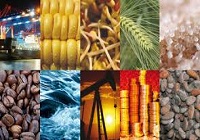Commodities market : How lack of information is creating opportunities for traders
When I talk about commodities market, I intend to discuss to how the trading and supply of various commodities occur around the world and how it affects prices in India and in the process make it easier to understand how this market functions and helps in setting up prices of different commodities around the world. But before I proceed, I must clear up the basics of this large global market that drives economies around the world into a turmoil with even small changes in the prices.
Essentially commodities market are like any other markets, a common place which may be virtual or physical, where buyers and sellers meet and price is governed by the laws of demand and supply. However presence of two types of participants in this market, namely arbitrageurs and speculators makes the functioning of this market that much more interesting. Commodities may broadly be categorized as of three types : Soft commodities (agricultural produce like corn, barley, cotton etc.), Hard commodities (metals such as iron, copper, gold etc.) and Energy (such as oil, power etc.). They are usually traded on an exchange(MCX, NYMEX etc.) through instruments known as futures just like stocks of companies are traded on National Stock Exchange and Bombay Stock Exchange.
In the Indian context we can see the onion market as an excellent example of market of a specific commodity, although less effective and not transparent with trades that are settled outside the purview of a central agency. The speculators in the Indian onion market are mostly hoarders who benefit from creating an artificial scarcity by storing commodities and restricting free supply. Due to shortage of supply and monopolistic tendencies, yet usually the same level of demand it so happens that people are willing to pay higher for the same amount of onions provided they do not cut back on consumption. The hoarders are able to benefit from this situation by getting a higher premium and hence higher margins on each trade. If we take hoarders out of the picture for the sake of simplicity, commodity trading usually takes advantage of what is referred to as ”price arbitrage”, which is taking advantage of difference in prices of the same commodity in two different markets because of difference in supply situation in both of them. For example the price of onions in Maharashtra would be lower because of abundant supply from multiple sources. however it may be substantially higher in other states of North India. This may be attributed to following causes: Firstly because of transportation and logistics cost involved in making the commodity available in those markets and secondly due to higher demand.
A commodities trader can benefit from such difference in prices by buying when prices of commodities is low and supplying it wherever it is high. Sounds simple, right? However it is not that simple. In international trading speculators and arbitrageurs are accounted for since trading is mostly online and information is symmetric i.e it is available with everyone hence it is easy for everyone to be a part of the trading world. A large number of market participants, i.e both the suppliers and consumers, ensure that the prices are usually reflective of the pure interplay of supply and demand. Moreover there are a lot of risk involved when trading at such a level such as price risk which means that a trader may buy a large amount of a particular commodity hoping that its price will rise in the future and may face large losses if what he expects does not happen. Also a trader faces multiple risks in transporting and finding the right buyers.
In the international markets the prices of commodities can fluctuate because of multiple reasons that are usually beyond control of a single trading house. Most of them are concerned with geopolitical situation in countries supplying the commodities and the macroeconomic situation of the country which are on the consumption end of this market. Traders help in facilitating this market, by buying from commodities market where they are in excess to the place where it is needed and are in demand. In the process they make money by taking advantage of price differential i.e varying prices in the two markets and placing bets where market may be headed and from where they can make the most profitable trades. There are a lot of strategies and instruments involved in trading and managing risks which I intend to discuss in the coming blogs.
Click here for government certification in Accounting, Banking & Finance





6 Comments. Leave new
I appreciate your efforts. Kudos to your thought process.
Thank you Shubhangi .
Nice Article.
great work…
Thank you Kirtika and Ushant.
Very well articulated. And true, any leakage in the system creates an opportunity for some or the other party, be it (the leakage) lack of information or any leakage for that matter.